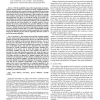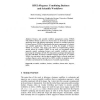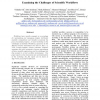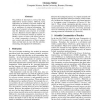144
click to vote
TASE
2010
IEEE
14 years 8 months ago
2010
IEEE
Abstract--With the availability of powerful computational and communication systems, scientists now readily access large, complicated derived datasets and build on those results to...
113
click to vote
SYNTHESE
2010
14 years 8 months ago
2010
In this paper I outline my conception of the epistemology of science, by reference to my published papers, showing how the ideas presented there fit together. In particular I disc...
104
click to vote
IJHPCA
2010
15 years 14 days ago
2010
Scientific workflows are frequently being used to model complex phenomena, to analyze instrumental data, to tie together information from distributed sources, and to pursue other ...
141
click to vote
ICSOC
2010
Springer
15 years 15 days ago
2010
Springer
Business and scientific workflow management systems (WfMS) offer different features to their users because they are developed for different application areas with different require...
135
click to vote
COMPUTER
2007
15 years 2 months ago
2007
Workflows have recently emerged as a paradigm for representing and managing complex distributed scientific computations and therefore accelerate the pace of scientific progress. A...
103
click to vote
IIE
2006
15 years 2 months ago
2006
Abstract. The International Olympiad in Informatics (IOI) aspires to be a science olympiad alongside such international olympiads in mathematics, physics, chemistry, and biology. I...
135
click to vote
CSCW
2006
ACM
15 years 2 months ago
2006
ACM
As the basic sciences become increasingly information-intensive, the management and use of research data presents new challenges in the collective activities that constitute schola...
CCR
2008
15 years 2 months ago
2008
The goal of this column this time was to address major scientific issues and propose novel scientific methods for doing the same thing under different names. However, it turned ou...
131
Voted
LWA
2008
15 years 3 months ago
2008
The problem of information overload has been addressed by several systems. However, many approaches are limited to informal artifacts and need to refer to the user for reference o...
123
click to vote
DIS
2008
Springer
15 years 3 months ago
2008
Springer
Abstract. This paper proposes initial steps towards a generic framework for modeling the scientific process. It is generic according to two main axes. First, it can be instantiated...




